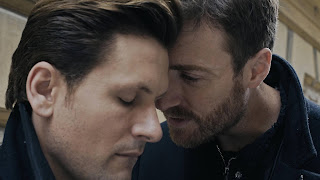Movie Review - The Power of the Dog
Benedict Cumberbatch (Doctor Strange and Star Trek Into Darkness) stars as Phil Burbank, a rancher living in Montana, 1925. Instead of sheep, he has a cattle ranch where he herds cows. It's not clear at first, but he comes from a wealthy family. His parents seem very wealthy and very high-society. So much so, they have a relationship with the governor of Montana. He lives in a huge house on his property, which requires servants like maids and cooks. However, Phil isn't snobbish or looks high-society. Despite not needing to do so, Phil does the dirty work of ranching. In fact, he's criticized for not cleaning himself and stinking. Despite being educated, he always doesn't talk like he is. In a subtle revelation, Phil appears dirty and dumb because he's trying to maintain his mask of masculinity. In other words, he's in the closet.
Jesse Plemons (Jungle Cruise and Judas and the Black Messiah) co-stars as George Burbank, the brother to Phil whom Phil calls "fatso." Unlike his brother, George is more high-society or at least he wants to be. George is always clean and dresses nicely, in suits. He doesn't get his hands dirty. He has some education, but he doesn't have the Ivy League education that his brother has. He's also more socially awkward than his brother who can be charming and the life of the party. George, however, doesn't even know how to play a musical instrument unlike his brother who can play the banjo or guitar.What's strange is when the film begins, the relationship between Phil and George wasn't clear. Phil calls him brother early, but the way that Phil behaves toward George, it could almost be confused for that of a jealous lover. Early in the film, there are several scenes where the two brothers share a bed. If you missed the brotherly reference, one could confuse them for homosexual partners. Yet, it seems as if Phil is in love with his George incestuously, but George doesn't feel the same. Phil's feelings seem unrequited. George definitely has a coldness toward Phil that's never really explained. It could stem from George's knowledge of Phil's homosexuality or just having had enough of Phil's closeted, toxic behavior.
Kirsten Dunst (Spider-Man and Interview with the Vampire) also co-stars as Rose Gordon, a widow and mother who runs a restaurant in Montana. She has a son who is about to go to college. She used to play piano for a cinema, probably before her husband died. Now, all her time is focused on cooking for travelers passing through her town. One day, she meets Phil and George who stop in her town for food and a hotel room. George takes a liking to her, quickly romances and marries her. She then goes to live with George at his and Phil's ranch.What follows could've been akin to Giant (1956) where a triangle forms between Rose and the two brothers. Yet, it veers off. Through subtlety and nuance, the film identifies Phil as being gay. It's never totally overt, although some could point to some homoerotic moments. It's clear that he prefers the company of men and Rose's presence upsets his tough balance. It seems as if his goal is to engage in a kind of cold war against Rose. The film could've been akin to Brideshead Revisited (2008), but the rivalry between Phil and Rose is never as dramatic as it could have been. Writer-director Jane Campion keeps things subtle and muted for the most part. This is due to the fact that Cumberbatch and Dunst don't really have too many scenes together.
Kodi Smit-McPhee (X-Men: Apocalypse and The Road) rounds out the cast as Peter Gordon, the son of Rose who wants to go to college to study to become a doctor. He has artistic pursuits, such as a picture album and making paper flowers. Because of the way he dresses, people tease him for being gay. People even yell slurs at him that are anti-gay. At no point does anyone have a conversation with Peter about his sexuality or what he feels about dating or anything. His mother never even broaches the subject with her son. I suppose since these things are never directly rebutted, we're meant to assume that he is gay.One then assumes that something will occur between Phil and Peter. Essentially, something does, but it's nothing steamy, passionate or all that physical. It's certainly nothing on the same level as the same-sex relationship in Brokeback Mountain. There's no kissing, no intercourse. It could thus be described as nothing more than a mentor relationship. It perhaps would have leaned more into soap opera territory if Phil and Peter had hooked up. Phil at this point is Peter's uncle. Even though they're only related by marriage, it's quasi-incestuous. Yet, the beginning of this film had me convinced something incestuous was occurring between Phil and his brother, so why not Phil and his nephew?
Rated R for brief sexual content and full nudity.
Running Time: 2 hrs. and 8 mins.
Available on Netflix.














Comments
Post a Comment